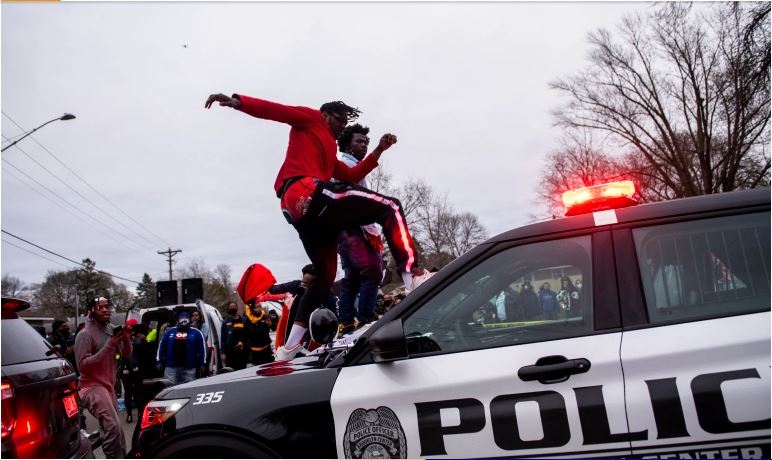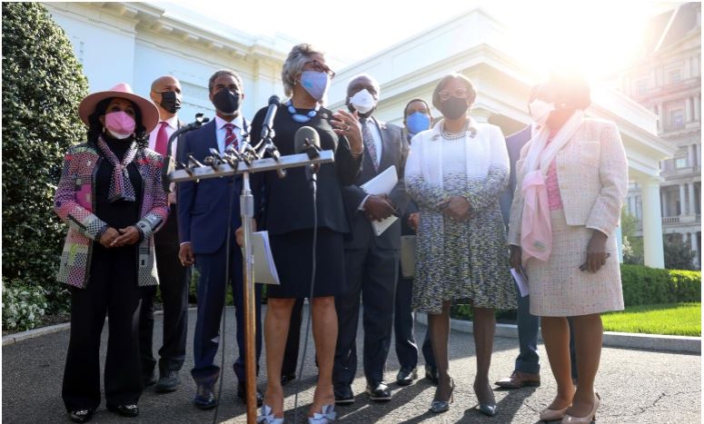Black American slaves were promised “40 acres and a mule” by the US government in the aftermath of the Civil War that freed them in 1865, a promise that was rescinded soon after it was made.
In the century and a half since, facing racism and repression, Black Americans have called for reparations, a notion that has vexed political leaders and an idea that has been met with significant resistance along the way.
Now, for the first time in its history, the United States government is moving towards addressing the question of reparations for the descendants of African slaves.
President Joe Biden in a meeting at the White House on Tuesday with Black US legislators renewed his support for a commission to study how the US can compensate the descendants of African slaves.
“We are grateful for that because we are now doing something historically that’s never been done,” Representative Sheila Jackson Lee said of Biden’s commitment.
“What you want the president to do is say that as we move forward,” Jackson Lee told reporters at the White House.
There were four million African slaves in the US when slavery was abolished after the Civil War.
So called “Jim Crow” laws in the southern states dispossessed Black farmers from their lands and institutionalised segregation and disenfranchisement. Now there are more than 42 million African-American citizens of the US.
In 2019, the average wealth of Black families amounted to $36,000, compared to $189,000 for whites, according to US Federal Reserve data. Black men are almost twice as likely as whites to be unemployed and are six times more likely to be imprisoned, according to government statistics.
Reparations for former slaves have been talked about in American politics for decades but there has never been consensus on what should be done. A Reuters/Ipsos poll conducted in June 2020 found only 20 percent of US adults support paying money to the descendants of slaves.
“The US has never fully or properly reckoned with the gross human rights violation of chattel slavery and the post-emancipation racist policies that continue to harm Black people in the US today,” said Dreisen Heath, a researcher and advocate for reparations at Human Rights Watch, a non-governmental organisation.
“If racial justice is ever to be achieved, repair needs to be a part of the equation,” she said.
Democrats in the US House of Representatives are moving to pass a bill to establish a commission to study and develop reparation proposals for African Americans. It passed the House Judiciary Committee by a vote of 25 to 17 late on Wednesday night.
In the wake of the Black Lives Matter protests that rocked the US in 2020 after the death of George Floyd and confronted with the rise of white nationalism, the establishment of a reparations commission would open a venue for badly-needed public dialogue about the systemic and long-term harms of racism in America, experts say.

“The history of trans-Atlantic slavery has left an indelible mark in the continued presence of racism, racial discrimination, and ideologies of racial superiority in US legal, political, social and economic structures and underscores the interconnection between the historical wrongs of slavery and contemporary injustices,” E Tendayi Achiume, a professor of law at the University of California – LA School of Law told a House panel earlier this year.
The scope of future recommendations goes far beyond financial compensation to descendants of slaves for lost wealth, said Achiume, who presented a report to the United Nations General Assembly in 2019 on the urgency of reparations for racial discrimination rooted in the slave trade and colonialism.
“The reparations commission will provide the foundation” for a “comprehensive accounting of the harms of slavery”, she said.
The House bill would establish a commission of 13 members to be appointed by Congress and the president to study the question of reparations and make national recommendations within a year.
The commission would be funded with $12 million to hire staff, obtain data and conduct hearings. Its mandate would be to document the institution of slavery in the US from the first arrival of Black slaves in 1619 to the end of the US Civil War in 1865. It would then assess the subsequent forms of discrimination that have harmed Black Americans since they were granted full US citizenship in 1868.
Recommendations would address how the US government should apologise for slavery, how US laws and policies continue to negatively affect African Americans and how these injuries can be reversed.
Advocates say reparations must go far beyond financial compensation implied by “40 acres and a mule”.
“We must be made whole,” said Kamm Howard, national co-chair of the National Coalition of Blacks for Reparations in America.
“Initiatives must be developed that address the negative, trans-generational, spiritual, emotional, mental and physical effects of the historical traumas of enslavement, Jim Crow apartheid, and the ongoing racial violence and police terror,” Howard said.
The legislation is opposed by US Republicans who will try to prevent it from reaching Biden’s desk by blocking it in the US Senate.
Progress on the legislation has been a long time coming. The bill has been introduced in every Congress since 1989. House committee approval on Wednesday is the first time it has been advanced toward a vote by the full House.
“We want to do the research. We want to hold the hearings. We want to formalize a process in which we can make sure we have the accurate information, and we can move forward to making our nation greater still,” Hilary O Shelton, director of the NAACP Washington bureau, told the House in February.
Latest Stories
-
Court orders mental evaluation for extradited Togolese robbery suspect
24 minutes -
Police destroy 120 changfang machines at Wassa Gyapa
2 hours -
‘Order from above’ keeps traders on the streets – Dr Oduro Osae
2 hours -
Lax bylaw enforcement to blame for traders’ street chaos – Dr Oduro Osae
3 hours -
Dram Oil requires recoveries from Alfapetro Ghana Ltd in alleged contract breach
3 hours -
Reduce squad size or I’ll quit – Guardiola to Man City
3 hours -
Talensi schoolgirls abandon classrooms for ‘wife duties’ at illegal mining sites
3 hours -
Concerned Zongo youths raid suspected criminal hideouts in Sogakope
3 hours -
Koforidua Circuit Court grants bail to 14 illegal miners
4 hours -
Trader in court over 500-gallon cooking oil fraud
4 hours -
Court jails apprentice for camera theft
4 hours -
De Bruyne bids farewell as Man City beat Bournemouth
4 hours -
Heavy evening rainfall floods Odorkor-Kwashieman road, causes traffic disruptions
4 hours -
Exotic dancer ‘The Punisher’ tells court how he discovered Diddy’s identity
4 hours -
Burglar family jailed for striker Isak’s home raid
5 hours

